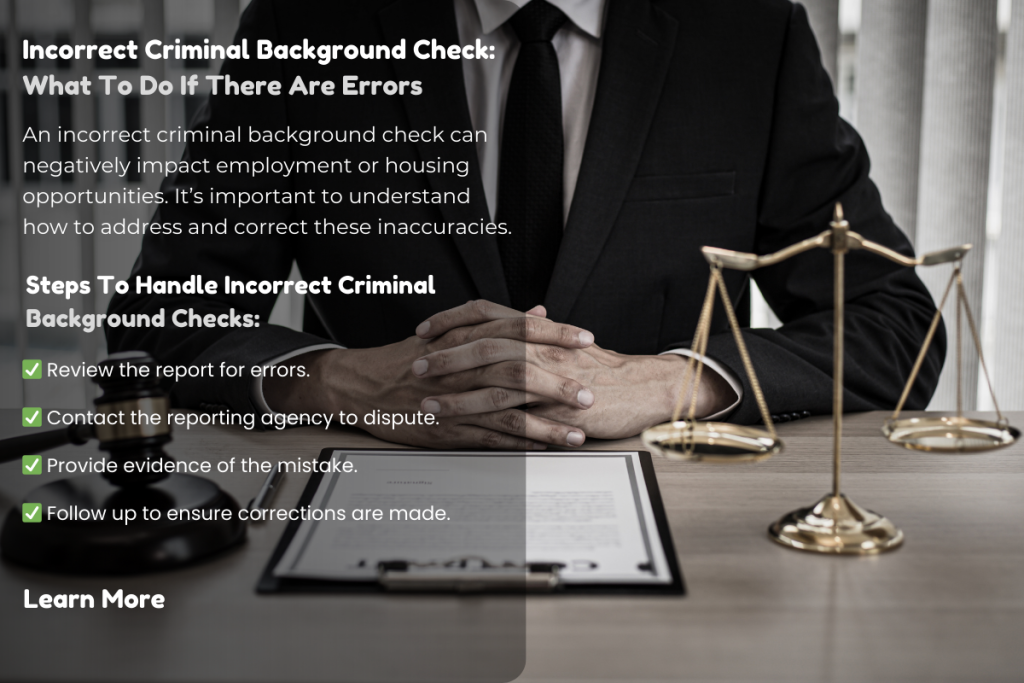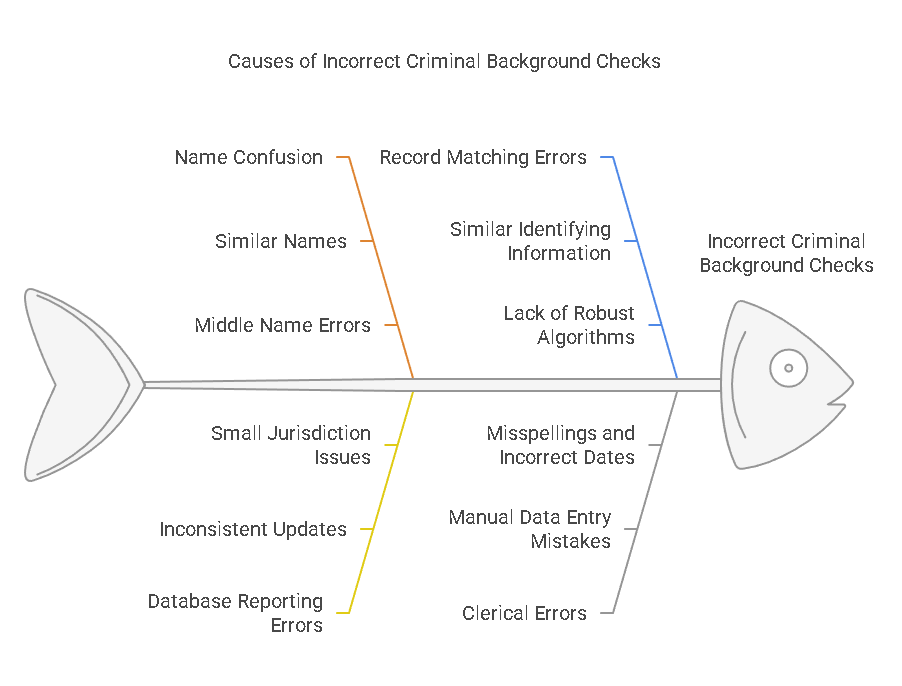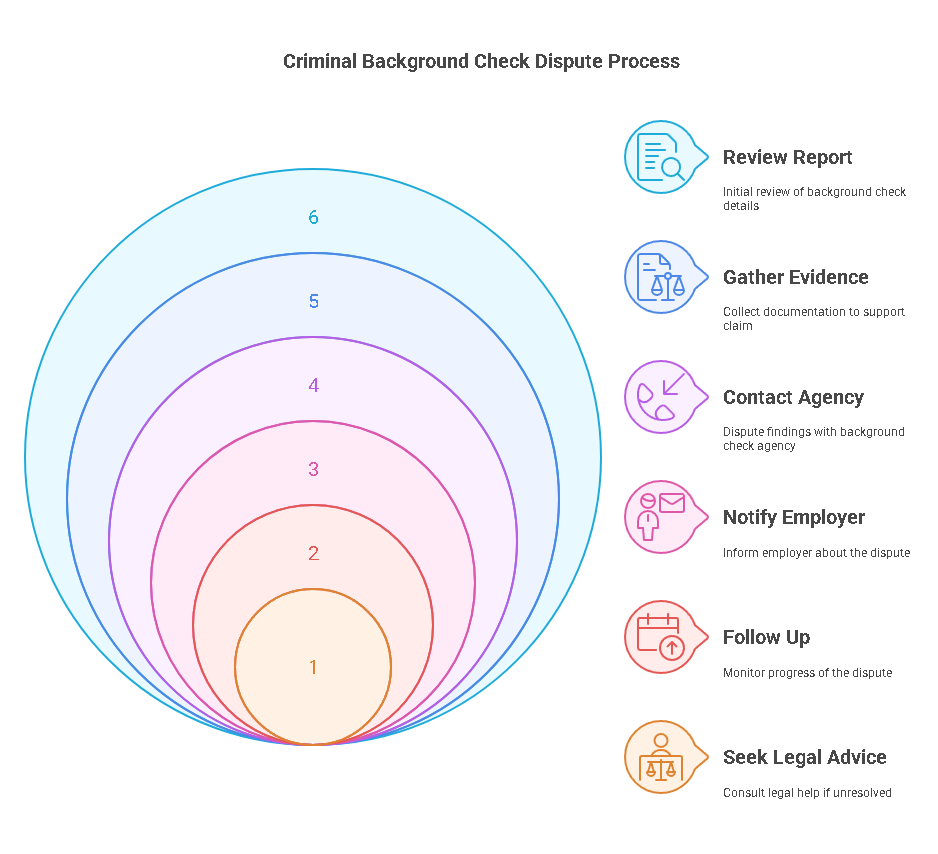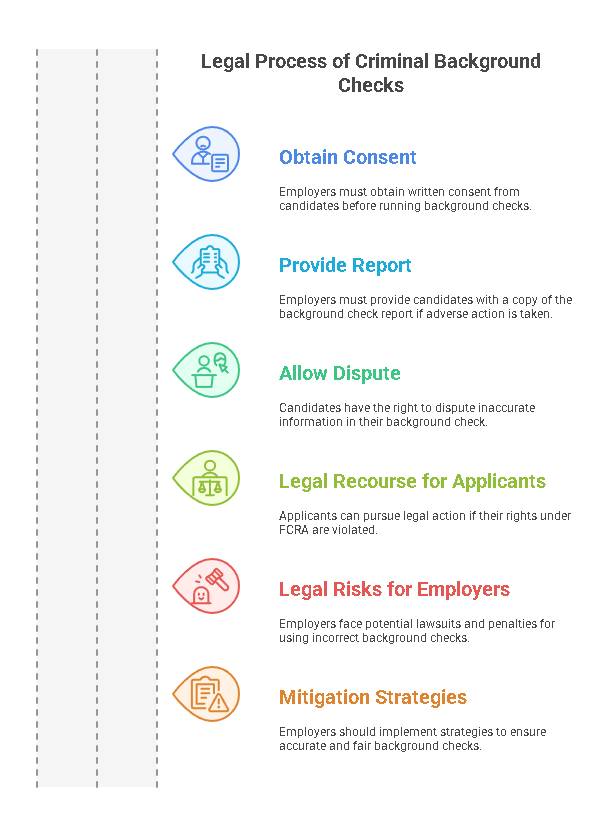How to Handle Incorrect Criminal Background Checks: A Guide for Job Seekers and Employers

Introduction to Incorrect Criminal Background Checks
A criminal background check is a common and vital tool for employers, landlords, and other organizations to assess the criminal history of individuals before making important decisions. These checks help verify an individual’s suitability for employment, housing, or other responsibilities, ensuring safety and compliance. However, an incorrect criminal background check can have serious repercussions for both the individual undergoing the check and the organization conducting it.
An incorrect criminal background check refers to any instance in which the information retrieved about an individual’s criminal record is inaccurate, outdated, or misidentified. This can occur for a variety of reasons, including clerical errors, database discrepancies, or issues during the record-keeping process. While criminal background checks are designed to protect organizations, when they contain inaccuracies, they can lead to wrongful rejections, reputation damage, and legal consequences.
Given the widespread use of background checks in employment and housing decisions, understanding the causes and consequences of incorrect background checks is essential for job applicants and employers alike.
Common Causes of Incorrect Criminal Background Checks

There are several reasons why criminal background checks may yield incorrect results. Understanding these causes can help both employers and applicants recognize potential errors and address them promptly. Below are some of the most common issues that lead to inaccuracies in criminal background checks:
- Name Confusion or Misreporting
Name confusion is one of the most common causes of incorrect criminal background checks. Individuals may share the same or very similar names, especially if they come from larger populations. This is particularly common when checking names that include common surnames like “Smith,” “Johnson,” or “Jones.” When conducting a search in public records, name matching errors can result in the wrong individual’s criminal record being linked to someone else. The consequences of such errors can be severe, as a person may be wrongfully implicated in a crime they did not commit simply because of a name similarity. In some cases, background check companies may mistakenly use middle names or initials, which can lead to further confusion. - Reporting Errors from County or State Databases
Criminal records are stored in local, state, and national databases, but these records are not always consistent. Different jurisdictions may update their databases at different rates, and some smaller jurisdictions may fail to update their criminal records as frequently. For example, a state may fail to update a person’s expunged criminal records, which could lead to a background check showing outdated or incorrect information. Additionally, smaller counties may not fully update their databases, causing inaccuracies in the records that are available to background check agencies. These discrepancies between jurisdictions can result in incomplete or inaccurate criminal background reports. - Incorrect Matching of Criminal Records
Another reason for incorrect criminal background checks is the erroneous matching of criminal records. A criminal background check can mistakenly associate an individual’s criminal record with another person who shares similar identifying information, such as a birth date or residential history. This is especially likely when records are not matched carefully or if the databases used do not have robust data matching algorithms. For example, if two people have similar names and birth dates, and they lived in the same area, their criminal records might be confused, resulting in the wrong person being identified. This issue is even more common when a background check is conducted in a rush or with outdated technology, which can increase the likelihood of errors. - Failure to Update Records
Criminal records need to be consistently updated to reflect changes such as expungements, changes in charges, or the completion of sentences. An outdated background check can present an incomplete picture of an individual’s criminal history, often including offenses that have been expunged or sealed. If a person has successfully completed a sentence, their criminal record may still show offenses that no longer reflect their current legal standing. This issue can be exacerbated if the background check service is using outdated or incomplete databases, which may not have access to the most current information. These outdated records can cause significant harm to applicants who are no longer involved in criminal activity but may still be affected by past mistakes. - Clerical and Administrative Errors
Sometimes criminal background checks are incorrect due to simple clerical mistakes or administrative errors. These errors can range from misspellings of names or addresses to incorrect reporting of dates or charges. Such errors can often be traced back to manual data entry mistakes, where the wrong information was entered into the system. These types of mistakes may seem minor but can have significant consequences for job applicants who find themselves facing unjust background check results.
Potential Consequences for Job Applicants and Employers
For Job Applicants
The consequences of an incorrect criminal background check for job applicants can be far-reaching and stressful. A false criminal record can lead to the wrongful rejection of an applicant, even if they have no criminal history or have already rehabilitated from past offenses. The impact of such an error is not limited to the immediate rejection of a job offer. When a background check shows inaccurate information, applicants can face damage to their reputation, increased stress, and difficulty in finding future employment. In some cases, applicants may have to go through an arduous process to correct the record, leading to further delays and complications in securing employment.
Moreover, individuals with inaccurate criminal records may be hesitant to apply for new jobs, fearing that their background will hold them back despite being fully qualified. This creates a barrier for people who have already turned their lives around or were never involved in criminal activity to begin with. It can result in the perpetuation of discrimination based on inaccurate or outdated data.
For Employers
Employers, on the other hand, face potential risks when relying on incorrect criminal background checks. For example, if an employer hires someone based on inaccurate information, they may inadvertently bring on a candidate who poses a risk to the organization. Employers can also face legal consequences if they fail to verify the information on a background check thoroughly or rely on inaccurate data that leads to a wrongful hiring decision. This can damage the reputation of the company, particularly if it becomes known that the business does not carefully vet its candidates.
In addition to the legal risks, employers can also face challenges with public perception. Hiring based on faulty background check information can create distrust among other employees, affect morale, and even impact the organization’s overall culture. Furthermore, the legal consequences of misusing criminal background check information can include lawsuits, fines, and other penalties, depending on the severity of the mistake.
The Importance of Accurate Criminal Background Checks
Criminal background checks serve as an important tool for employers to make informed decisions, but when errors occur, they can have serious implications for both job applicants and employers. A small mistake, such as name confusion or outdated records, can lead to wrongful rejections, reputational harm, and legal challenges. Both job applicants and employers must ensure the information provided in these background checks is accurate and up-to-date. Understanding the common causes of errors and knowing how to correct them is crucial for both parties to prevent the negative consequences that arise from inaccurate criminal background checks.
Steps to Take If Your Criminal Background Check Is Incorrect

When an incorrect criminal background check is reported, it’s crucial for job applicants to take immediate action. Whether the error is due to name confusion, outdated information, or misidentification, addressing the issue swiftly can prevent negative consequences such as wrongful rejection or damage to your reputation. Here is a step-by-step guide on what job applicants should do if they believe there is an error in their criminal background check:
- Review the Background Check Report Thoroughly
The first step is to carefully review the background check report. Pay attention to the details provided, such as the criminal record, the charges listed, and any personal information that may be incorrect, such as your name, birthdate, or address. Compare the information on the background check with your own records to identify any discrepancies. If there is a discrepancy between your personal details and what is listed on the report, you may need to prove your identity or request a re-check. - Obtain Documentation or Evidence of the Error
Once you identify an error, gather any documentation that can support your claim. This may include court records, arrest records, or any legal paperwork showing that your criminal record has been expunged or sealed. If the error is related to an incorrect charge or conviction, try to obtain documents that show the charges were dropped or dismissed. This documentation will be critical in proving that the criminal background check is inaccurate. - Contact the Background Check Agency
Reach out to the background check agency that performed the screening. Request a formal dispute of the findings and provide them with your evidence to support your case. Most reputable background check agencies are required to investigate disputed information and provide a response within 30 days, as per the Fair Credit Reporting Act (FCRA). Be sure to follow up with the agency to ensure that the dispute is being handled. - Notify the Employer
After disputing the background check with the agency, inform the employer who conducted the screening about the potential error. Let them know that you are working to resolve the issue and provide them with any relevant documentation or communication from the background check agency. This will help prevent an immediate hiring decision based on inaccurate information while the dispute is ongoing. - Follow Up and Monitor the Progress
It’s essential to stay proactive throughout the dispute process. Keep track of the timeline provided by the background check agency and follow up regularly to ensure that the issue is resolved promptly. Once the correction is made, ask for an updated copy of the background check and verify that the inaccuracies have been removed. - Seek Legal Advice if Necessary
If the issue is not resolved or if the incorrect information is causing significant harm (such as loss of employment opportunities), you may need to seek legal advice. A lawyer specializing in employment law or consumer rights may be able to guide you through the process of taking legal action against the background check agency or the employer, if necessary.
How Employers Can Ensure Accuracy in Background Checks
For employers, using an incorrect criminal background check can have serious consequences. Employers must take precautions to ensure that the background checks they rely on are accurate and up-to-date. Here are some best practices for conducting thorough and reliable criminal background screenings:
- Use Reputable Background Check Agencies
The first step in ensuring the accuracy of criminal background checks is to partner with a reputable, trusted background check agency. Companies like Precisehire offer reliable, compliant screening services and ensure that the background checks they provide are based on the most current and accurate data available. A trusted background screening provider will have robust systems in place to minimize errors and offer reliable, up-to-date information. - Verify the Identity of Candidates
One of the key reasons for incorrect criminal background checks is the misidentification of candidates. Employers should take steps to verify the identity of candidates before conducting a background check. This can include confirming full names, dates of birth, and other identifying information, and asking candidates to provide accurate details before running the check. Ensuring a clear and correct identification process helps avoid confusion and misreporting during the screening process. - Cross-Check Data with Multiple Sources
To increase the accuracy of background checks, employers should cross-check data with multiple databases. Criminal records are often stored in a variety of databases at the county, state, and federal levels. A thorough screening process will involve checking these databases to ensure that all available information is considered. Relying on a single source may lead to missed information or outdated records. - Stay Up-to-Date with Legal Regulations
Employers must also stay up-to-date with relevant legal requirements and regulations regarding background checks. Laws such as the Fair Credit Reporting Act (FCRA) and Equal Employment Opportunity Commission (EEOC) guidelines require employers to conduct background checks in a non-discriminatory, unbiased manner. By staying compliant with these laws, employers can avoid potential legal risks related to incorrect criminal background checks and ensure that they are using information responsibly. - Double-Check Criminal Records for Accuracy
Employers should also ensure that they are verifying the accuracy of criminal records before making a final decision. This may involve working with the background check agency to confirm the records and to make sure that they are up to date. If discrepancies are found, employers should follow up with the agency for clarification and ask for updated reports. - Offer Candidates the Opportunity to Dispute Information
Employers should inform candidates about the opportunity to dispute incorrect information on their criminal background checks. By offering candidates a transparent process, employers can help resolve potential errors before making final hiring decisions. This practice helps maintain fairness and can prevent future legal issues.
How Precisehire Can Help Ensure Accurate Criminal Background Checks
Precisehire is a trusted provider of employment screening services, offering comprehensive background check solutions designed to ensure accuracy and compliance. As a leading provider of screening services, Precisehire helps both employers and job seekers by providing reliable and up-to-date criminal background checks, offering assistance in resolving disputes, and ensuring compliance with relevant laws and regulations.
Here’s how Precisehire can assist employers and applicants with criminal background checks:
- Comprehensive Screening Solutions
Precisehire offers a wide range of background check services, including criminal history checks, employment verification, and drug testing. The company uses robust, updated databases to ensure the most accurate and comprehensive screening results. Precisehire’s detailed checks help reduce the likelihood of errors or discrepancies in the criminal background check process. - Tailored Solutions for Employers
Employers can work with Precisehire to create customized screening packages that meet their specific needs. Whether you are hiring for entry-level positions or more sensitive roles, Precisehire tailors its services to help employers make informed decisions while minimizing risks associated with inaccurate criminal records. Precisehire also offers support to help employers navigate any issues related to incorrect background checks. - Error Resolution Assistance
For applicants facing inaccurate background check results, Precisehire offers assistance in resolving disputes. Precisehire works with both employers and job seekers to verify the information and ensure that any errors are corrected in a timely and professional manner. Their customer service team is trained to handle disputes and can provide guidance on how to address errors efficiently. - Legal Compliance and Best Practices
Precisehire ensures that all background checks are conducted in full compliance with legal regulations, such as the FCRA, and that candidates’ privacy rights are respected. By using Precisehire, employers can avoid potential legal pitfalls associated with incorrect background checks and ensure that their hiring practices are both fair and legal.
Data Table: Common Causes of Incorrect Criminal Background Checks
| Cause of Error | Explanation | Impact on Applicant/Employer |
|---|---|---|
| Name Confusion or Misreporting | Name similarities between individuals or misreporting can lead to the wrong criminal record being linked to a person. | Wrongful accusations, potential job rejection, reputational damage. |
| Database Discrepancies | Some local or state databases may not be updated regularly, leading to outdated criminal records. | Incorrect criminal history reflected in the check, leading to missed opportunities. |
| Incorrect Matching of Criminal Records | Matching errors between individuals with similar personal details (e.g., birthdate, address). | Wrong person identified, causing a wrongful job rejection or legal risks. |
| Clerical Errors | Simple data entry mistakes like misspelled names or incorrect dates can cause errors in the background check report. | Minor mistakes lead to delays in the hiring process or wrongful disqualification. |
Legal Aspects of Incorrect Criminal Background Checks

Incorrect criminal background checks can have serious consequences for both job applicants and employers. Inaccurate background check results may lead to wrongful rejections, legal action, or reputational harm. To navigate these potential risks, both job seekers and employers must understand the legal guidelines surrounding background checks, including the Fair Credit Reporting Act (FCRA) and other related regulations.
Fair Credit Reporting Act (FCRA)
The Fair Credit Reporting Act (FCRA) is a federal law that regulates how employers can use background checks in the hiring process. Under the FCRA, employers must:
- Obtain Consent: Before running a criminal background check, employers must obtain written consent from the candidate. This ensures that applicants are aware of the screening process and have the opportunity to review their records before the employer uses the information.
- Provide a Copy of the Report: If an employer decides to take an adverse action based on the results of a background check (e.g., rejecting a job candidate), they must provide the applicant with a copy of the report. This allows applicants to review the information and address any discrepancies.
- Allow the Candidate to Dispute: The FCRA gives job applicants the right to dispute inaccurate information in their criminal background check. If an applicant identifies an error, they can file a dispute with the reporting agency. The agency is required to investigate the dispute and resolve it within 30 days.
Legal Implications for Job Applicants
If an applicant’s criminal background check is incorrect and they are unfairly rejected from a job, they may be entitled to legal recourse under the FCRA. In some cases, applicants may have grounds to file a lawsuit for damages if the employer or background check agency fails to follow proper procedures, such as not correcting errors or not informing the applicant about the mistake.
Applicants can also take legal action if the background check results in discrimination. The Equal Employment Opportunity Commission (EEOC) prohibits employers from using criminal records in a discriminatory manner, particularly when the information disproportionately affects applicants from certain racial or ethnic groups. Applicants who believe they were discriminated against based on inaccurate criminal background check results may file a complaint with the EEOC.
Legal Risks for Employers
Employers who use incorrect or outdated criminal background checks in their hiring process risk facing legal action from the affected applicants. If an applicant’s rights are violated under the FCRA or if the employer engages in discriminatory practices, the employer could be subject to lawsuits, penalties, and reputational damage.
To mitigate these risks, employers must ensure that background checks are accurate, up-to-date, and compliant with federal and state laws. It is also essential that employers maintain a fair and consistent process for evaluating criminal records, as this helps prevent allegations of discrimination.
Employers should also be mindful of state-specific laws that may impose additional restrictions on the use of criminal background checks. For example, some states prohibit employers from considering criminal convictions that are older than a certain period, while others restrict the use of criminal history in hiring decisions for certain roles, particularly those involving sensitive information or vulnerable populations.
Frequently Asked Questions (FAQs)
Can an employer legally use an incorrect background check to reject a job applicant?
No, an employer cannot legally reject a job applicant based solely on an incorrect criminal background check. The employer must take reasonable steps to verify the accuracy of the information before making any hiring decisions. If a candidate disputes the findings of the background check, the employer must consider the dispute and provide the candidate with an opportunity to correct any errors.
How long does it take to correct a criminal background check?
The time it takes to correct an incorrect criminal background check can vary. According to the FCRA, the background check agency is required to investigate any disputes within 30 days. However, the process could take longer if additional documentation or clarification is needed. Applicants should follow up regularly to ensure that the issue is being addressed.
What should I do if my criminal background check shows a record that is not mine?
If your criminal background check shows a record that does not belong to you, you should immediately contact the background check agency to dispute the error. Provide any supporting documentation (such as court records or proof of expungement) to demonstrate that the record is incorrect. Additionally, notify the employer of the discrepancy to prevent the wrongful rejection of your application.
Can I still get hired if an incorrect background check has been used?
Yes, you can still be hired even if an incorrect background check has been used. If the employer is made aware of the mistake and the background check is corrected, they may reconsider the hiring decision. Employers are legally required to allow applicants an opportunity to dispute incorrect information before making final decisions.
What can employers do to ensure they don’t rely on incorrect background checks?
Employers can take several steps to ensure the accuracy of their criminal background checks. These include partnering with reputable background check agencies, verifying candidate identity details, cross-checking data from multiple sources, and following up on any discrepancies. Employers should also inform candidates about their right to dispute incorrect information.
Conclusion
In conclusion, incorrect criminal background checks can have significant consequences for both job applicants and employers. Job applicants must take swift action to dispute inaccurate information, while employers must ensure that they are using accurate and up-to-date criminal background checks in their hiring process. The legal implications of relying on incorrect background checks can lead to lawsuits, penalties, and reputational damage, making it crucial for employers to prioritize accuracy and compliance with laws such as the Fair Credit Reporting Act (FCRA).
To avoid these issues, employers and job seekers alike can benefit from working with a trusted provider like Precisehire, which offers accurate, reliable, and legally compliant screening services. By following best practices and maintaining transparency, both parties can navigate the background check process successfully, ensuring that hiring decisions are based on accurate, up-to-date information.
By staying informed about the legal framework and procedures for resolving background check errors, both job seekers and employers can protect their interests and maintain a fair, lawful hiring process.
